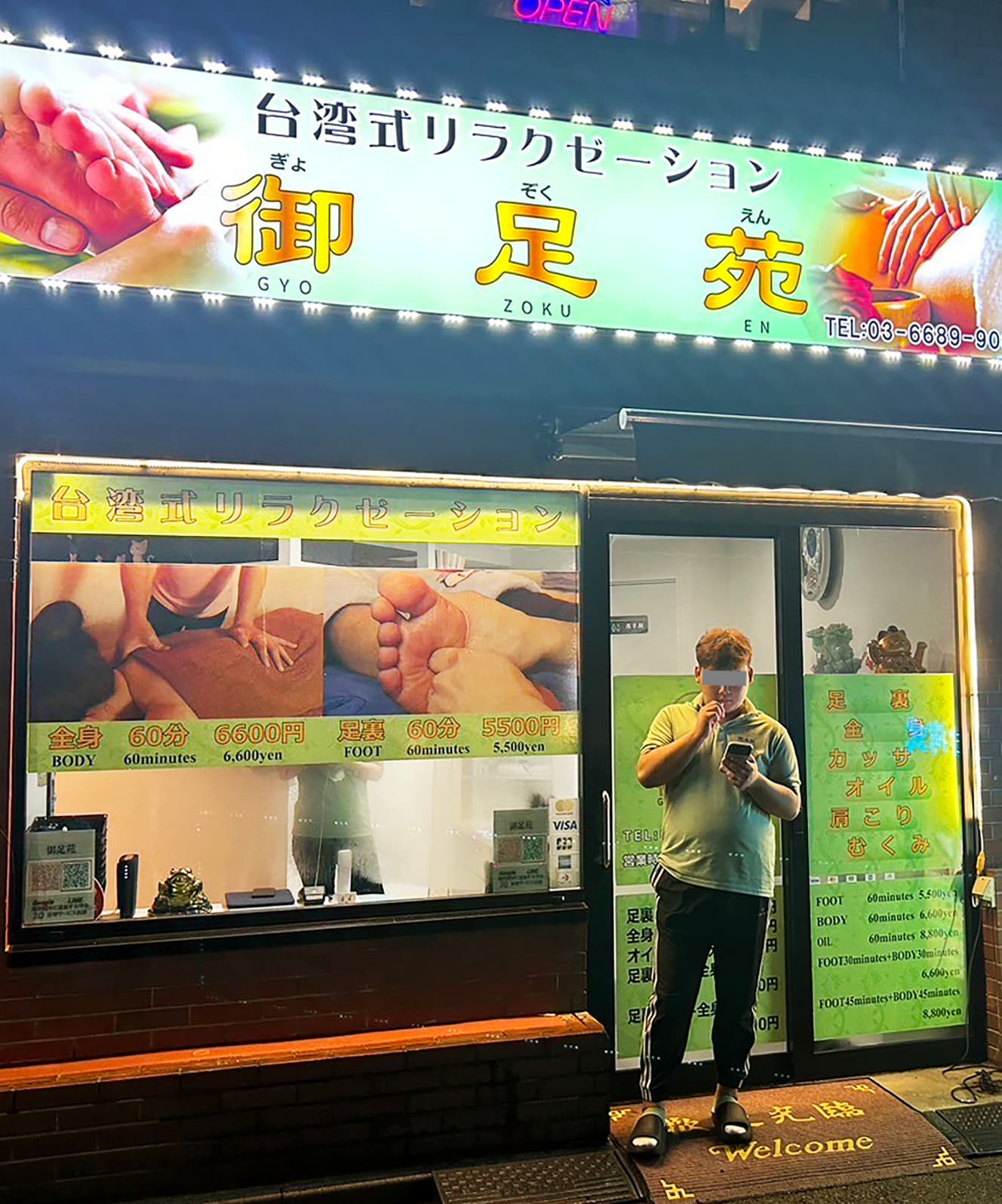Beware of Love Therapists in Kabukicho Offering Relaxation and Affection
Customers Seeking Romance with Their Favorite Therapists
The Situation of Relaxation Shops in Kabukicho

There are oddly many Taiwanese-style foot reflexology street shops in Kabukicho. Despite having over ten similar-priced shops within a 300-meter radius, new establishments continue to open. One of them is “Gyosoku-en,” which opened in April this year.
“I came to Japan from China 17 years ago. At first, I studied and worked in Osaka, and about eight years ago, I started working at a foot reflexology shop in Kabukicho.”
This is said by a Chinese therapist known as “Number 33.” He is the manager of “Gyosoku-en” and the most popular male therapist there.
“At first, there were no customers who requested me, so I couldn’t make a living just from treatments, so I also worked at the reception. As I became more popular, my schedule filled up with requests, so I stopped working at the reception. At my busiest times, I had around 100 customers requesting me in a month,” he adds.
Mr. 33 had over 100 requests per month. Jobs in the relaxation field are easier than other part-time jobs, especially for those who struggle with Japanese, as they don’t need to talk much, making it popular among international students. However, there are some tips for succeeding as a therapist in Kabukicho.
“Many of my clients are women who work in cabarets, where they stand in dress shoes for long hours, and those who drink alcohol tend to have swollen feet. Regular customers often come multiple times a week. The Kabukicho area is small, so word of mouth and referrals help build popularity. Since everyone works in Kabukicho, they understand the system of requests, which directly translates to sales. Because many therapists can’t speak Japanese, it’s crucial to communicate with customers,” he explains.
Salaries are based entirely on commission, meaning therapists earn money for the treatments they perform. If they have requests, they can make a good income, but those without regular customers compete for a limited number of walk-in clients. After treatments, it’s standard to give customers a business card with their number written on it to promote themselves. However, some male therapists engage in the characteristic sales tactics of Kabukicho.
“There was a colleague who flirted with customers. They exchanged LINE contacts and had conversations like they were in a relationship. Among the clients who are obsessed with hosts, there are many who, after not getting along with hosts, turn to therapists for romance. Some therapists even get invited to dinner or asked for sexual favors at hotels by requested customers. However, since therapists don’t act like hosts, many clients genuinely believe they are in love,” says a therapist known as Sho, age 22.
Whispering words of love in clumsy Japanese was all a lie. Just like the host clubs they usually visit, customers create their favorite therapists and seek romance, leading to a negative cycle characteristic of Kabukicho.
According to Mr. 33, even during tough times without requests, it’s better not to engage in excessive customer service, as this will attract customers later. He only accepts requested customers and has now become a business owner with his own shop.
“It’s a small shop, and the interior still needs work, but I want to invest money to make it beautiful and open a second location in Kabukicho. By improving the skills of all the staff and raising the shop’s reputation, we can steadily increase the number of new stores. This city is where I met my customers and learned how to earn, so I want to make it the number one relaxation shop in this area.”
Kabukicho is a city where not only hosts and cabaret clubs, but also therapists from China can dream of striking it rich.
The drama “Shinjuku Yasen Byoin” (Fuji TV) is currently participating in filming cooperation. Sasaki Chihuahua’s book “Hosts! Standing People! To-Yoko! Overdose People” (Kodansha) is now on sale and receiving positive reviews!
From the September 20, 2024 issue of ‘FRIDAY.’
Interview and text: Sasaki Chihuahua
